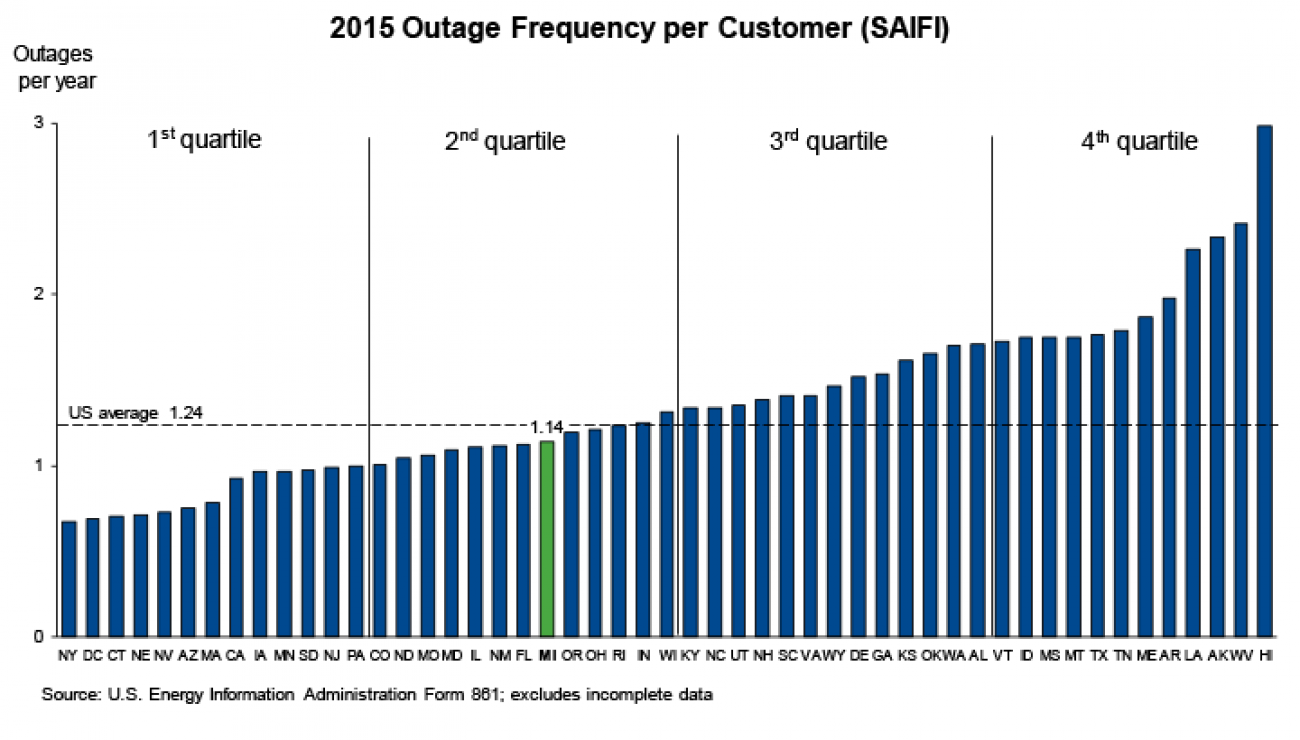Michigan’s electric reliability: Better than the national average


A recent Bridge Magazine article citing information from the Eaton Blackout Tracker Report claimed that Michigan is the fourth-worst state for the number of electric outages per capita. This statement is simply incorrect – the data from the Eaton Report was anecdotal at best, relying on newspaper articles, websites and personal accounts rather than the outage data that all utilities routinely report to the federal government. Official government data provided by the Energy Information Administration (EIA) shows that in 2015 (most recent data available), Michigan was better than the national average in terms of the number of power outages per customer, ranking better than its neighboring states Ohio and Indiana, and slightly behind Illinois.

Deeply committed to providing reliable energy
2015 is not an anomaly. Historically, the frequency of outages in Michigan is lower than the national average. However, the duration of the outages in Michigan, once they occur, is longer than the average - that is our challenge. DTE Energy knows there is much work to do in Michigan to provide highly reliable service to our customers, and much of that work is underway. We are deeply committed to strengthening the energy grid to prepare for natural disasters like the one we recently experienced. The company is in the midst of a multi-year investment program designed to have a significant impact on reliability while keeping our customers’ bills below the national average. Utilities know what causes outages. We track this information in great detail and use it to determine where the investments we make on behalf of our customers will provide the greatest reliability benefits.
One of the primary areas we are focused on is our enhanced tree trimming strategy, as two-thirds of the time our customers spend without power is caused by tree-related problems. In fact, trees were responsible for more than 85 percent of the outages in the March wind storm. Last year alone, we trimmed 650,000 trees; in areas where we’ve completed trimming, customer reliability has improved 70 percent. At the same time, we are investing in upgrading our infrastructure (such as poles and cable) and redesigning our circuits and substations to increase the resiliency of the system and improve overall reliability. These new and upgraded substations also are helping Michigan’s economy as they allow the company to serve more customers, making the state a smart choice for new and growing businesses.
Thanks to smart meters (Advanced Metering Infrastructure, or AMI), DTE now has the ability to learn about customer outages instantly. This technology was instrumental in helping us understand where the outages were during the March wind storm and helped us plan and implement our restoration strategy. As DTE installs additional smart sensors and other modern technologies on the energy grid, we will learn more about the health of our electric system in real time, and will be able to flag and correct equipment problems before an outage occurs.
Hardening the system for Michigan’s extreme weather
As we learned all too well on March 8, intense weather can have a devastating impact on energy infrastructure. Tropical force winds pounded Michigan for 12 hours, toppling large trees and tree limbs onto DTE’s power lines and snapping more than 1,200 utility poles. This resulted in more than 12,000 reported downed wires (a normal catastrophic storm would have ~600 downed wires). 800,000 DTE Energy customers lost power across a dozen Southeast Michigan counties in our service territory. At the height of the storm, about 40 percent of DTE customers were impacted, the highest percentage in our 100+ year history. We restored power at a historic pace, with 70 percent of customers restored in two days and nearly 95 percent of all customers restored in four days. I am proud of our employees who worked around the clock to make this happen. Unfortunately, due to the extent of the storm’s damage, restoring the last five percent required three days, as we addressed over 20,000 cases of smaller customer or single customer outages, often associated with large downed trees. This caused some of our customers to experience prolonged disruption and hardship.
While we cannot control extreme weather, we are hardening our infrastructure to help reduce the likelihood of what happened on March 8 from occurring again. But like a lot of infrastructure across Michigan, DTE’s electrical system was built a long time ago – in fact, some of our infrastructure is more than 60 years old. We have worked to extend the serviceable life of existing equipment to keep our bills affordable, but in many areas it is time to invest in new, modern infrastructure. While we have started an aggressive investment plan, it will take time to complete our grid modernization. We are committed to delivering the reliability and peace of mind that our customers expect - and to build an electric grid that meets the needs of the 21st century economy.
See what new members are saying about why they donated to Bridge Michigan:
- “In order for this information to be accurate and unbiased it must be underwritten by its readers, not by special interests.” - Larry S.
- “Not many other media sources report on the topics Bridge does.” - Susan B.
- “Your journalism is outstanding and rare these days.” - Mark S.
If you want to ensure the future of nonpartisan, nonprofit Michigan journalism, please become a member today. You, too, will be asked why you donated and maybe we'll feature your quote next time!